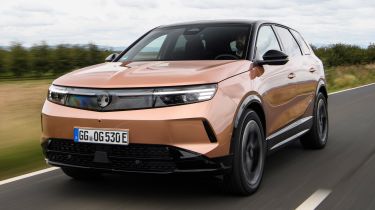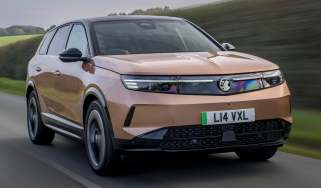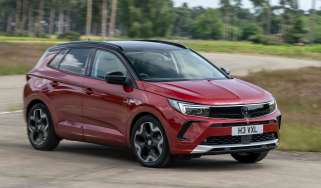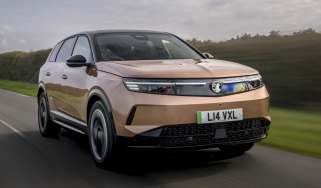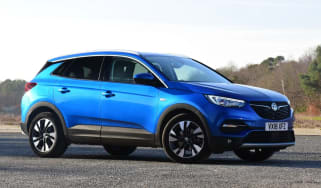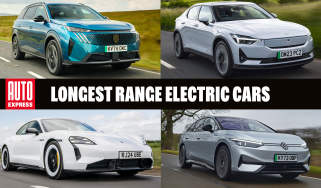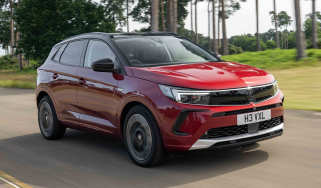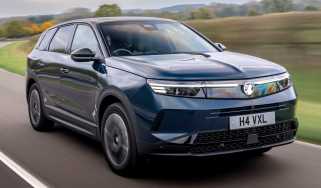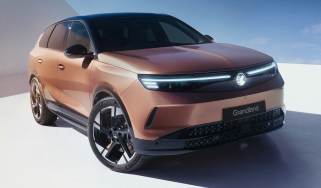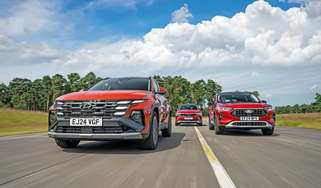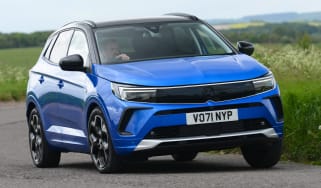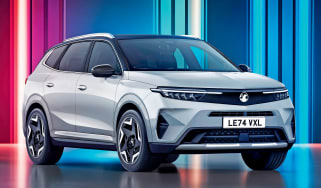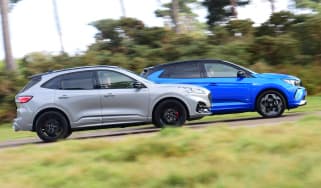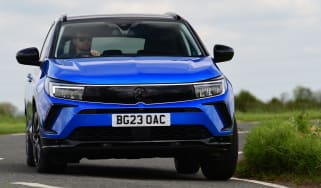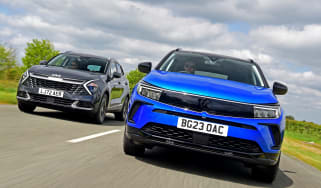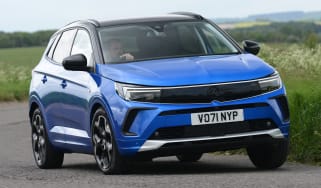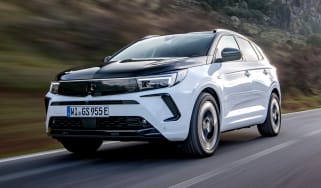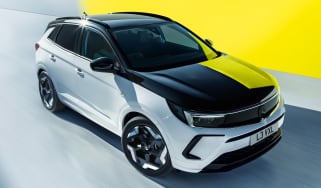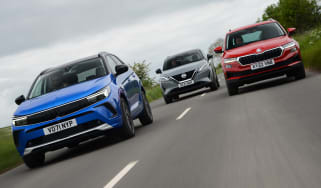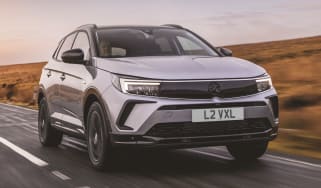Vauxhall Grandland review
The Vauxhall Grandland is a genuine contender in the family SUV class thanks to its practicality and attractive pricing. But it’s a shame it’s not particularly interesting to drive

Is the Vauxhall Grandland a good car?
The latest Vauxhall Grandland is a huge improvement over the original. There are some real family-friendly touches to accompany class-leading practicality, although we’ve seen better quality interiors. Equipment levels are decent on mid-spec models and above, plus it now offers a classier design, too. But it’s far from the best to drive in this segment, especially in mild-hybrid form, with an unnecessarily firm ride and vague steering holding it back. The EV is our preferred choice from behind the wheel, and with well over 400 miles of range for the incoming 97kWh battery model, the Grandland Electric looks a particularly strong choice.
| Key specs | |
| Fuel type | Petrol mild-hybrid, plug-in hybrid, Electric |
| Body style | SUV |
| Powertrain | Petrol mild-hybrid, plug-in hybrid, single and dual-motor EV with 73kWh and 97kWh batteries |
| Warranty | Three-years/60,000 miles |
How much does the Vauxhall Grandland cost?
This is the all-new Vauxhall Grandland, and it’s a big deal. Since joining the vast Stellantis group, the British brand has effectively leveraged the car platforms available to it, but this is the first time that Vauxhall has been there right at the inception of a new architecture. The car might share a name and segment with the previous Vauxhall Grandland, but it represents a huge step forward – both in terms of its technical elements and its design.
The new Vauxhall Grandland will be launched in both all-electric and combustion forms, drawing its technical basis from Stellantis’ new STLA Medium platform that you’ll also find in use by Peugeot with its new E-3008. The two share an awful lot under the skin, but even when you look really hard, there’s little on the surface to suggest that is the case.
Used - available now

2023 Kia
Sportage
30,260 milesManualPetrol1.6L
Cash £18,700
2023 Hyundai
i20
5,699 milesAutomaticPetrol1.0L
Cash £14,887
2020 Mazda
MX-30
18,937 milesAutomaticElectric
Cash £11,087
2022 MINI
Countryman
27,026 milesAutomaticPetrol2.0L
Cash £24,087This is no longer the plainly styled and value-focused mid-size SUV that the previous Vauxhall Grandland was. Instead, Vauxhall has gone all-out to create its own distinctive style and presence, with clever design tricks and a more up-to-date interior than before.
The Grandland range is made up of Design, GS and Ultimate trim levels for both the mild-hybrid and all-electric models. Pricing starts at just under £35,000 for the MHEV Design, rising to around £36,500 for the GS and just over £38,000 for the Ultimate. The Vauxhall Grandland Electric costs just under £41,000 in Design, just over £43,000 in GS and around £45,000 in Ultimate form. A plug-in hybrid model will join the line-up in 2025.
Design specification gets Vauxhall’s ‘PureSense’ safety systems as standard, including adaptive cruise control, lane keep assist, driver drowsiness detection and front and rear parking sensors. You’ll find twin 10-inch displays inside with wireless Apple CarPlay and Android Auto compatibility, dual-zone climate control and rain-sensitive windscreen wipers. On the outside there are 19-inch alloy wheels, Vauxhall’s new ‘3D Vizor’ look at the front end, an illuminated rear Vauxhall nameplate (integrated within the light bar) and a body-coloured rear spoiler.
GS gains Vauxhall’s ‘Intelli-lux’ HD headlights, a rear view camera, a 16-inch central touchscreen, sat-nav with over-the-air updates, two additional rear USB-C sockets and a wireless charger within a new ‘pixel box’ storage unit. There’s also a heated steering wheel, heated front seats and ambient lighting. The exterior gains an illuminated badge at the front, 19-inch diamond-cut wheels, a contrasting black roof, tinted rear windows and gloss black bumpers.
Above this is the Ultimate, which adds Vauxhall’s latest ‘Intelli-drive 2.0’ safety equipment with lane change assist, rear cross traffic alert, semi-autonomous lane change, curve speed adaptation and a 360-degree panoramic camera. There’s also an uprated sound system, head-up display and a powered bootlid.
Powering the mild-hybrid Grandland is a 1.2-litre, three-cylinder petrol unit mated to a 48V hybrid system and a 28bhp electric motor, for a total of 134bhp. This is combined with a six-speed dual-clutch transmission.
The Grandland Electric comes with a 73kWh battery and 210bhp electric motor for a range of up to 325 miles. Another, larger battery will arrive in 2025 with a 97kWh capacity, allowing for a range of 435 miles.
Vauxhall Grandland alternatives
The mid-sized family SUV market is heavily congested and the previous Grandland not only had combustion-engined cars to worry about, but EVs too. The new Grandland also fights on both of those fronts, thanks to its STLA Medium platform, which accommodates MHEV and BEV power. Key rivals include the Hyundai Tucson, Kia Sportage, Ford Kuga, Nissan Qashqai and Volkswagen Tiguan. The Grandland Electric, meanwhile, takes on its Stellantis stablemate, the Peugeot E-3008, as well as the Volkswagen ID.4, Kia EV6, Nissan Ariya and Hyundai Ioniq 5.
Engines, performance & drive
The Vauxhall Grandland aims to be the sportier counterpart of the Peugeot 3008, but fails to produce any real driving engagement. The mild-hybrid’s ride is unsettled and while the steering is well weighted, there’s not a lot of feedback. The all-electric version manages to soak up bumps far better and provides a noticeable increase in power, but it’s still not particularly fun from behind the wheel. Read more about the engines, performance and drive of the Vauxhall Grandland…
MPG, emissions & running costs
Despite being a mid-size SUV with plenty of space for a family, the Vauxhall Grandland shouldn’t prove too costly to run. The mild-hybrid system is frugal and emits less CO2 than many of its rivals, making it potentially appealing for company car buyers. The PHEV should be even more attractive in this regard when it arrives. The all-electric version comes with an excellent range on both the small and large battery models, but the charging speeds are distinctly average. Read more about the MPG, emissions and running costs of the Vauxhall Grandland…
Interior, design & technology
Vauxhall picked out the Volkswagen Tiguan and the ID.4 as direct rivals to the Grandland and while the exterior design is certainly a match for those cars, interior quality is lacking, not just in comparison with the German models, but with most of the class. The slim touchscreen is an innovative idea, though, and we look forward to seeing the coming over-the-air updates. Read more about the interior, design and technology of the Vauxhall Grandland…
Boot space, comfort & practicality
Thanks to larger exterior dimensions, the interior of the Grandland is more spacious than before. Aside from rear foot room not being great for a car this size, there’s very little to complain about in terms of practicality. Cabin storage is a big bonus, with clever solutions such as the centre console that opens for either front occupant. Read more about the boot space, comfort and practicality of the Vauxhall Grandland…
Reliability & safety
The latest Vauxhall Grandland hasn’t been tested by Euro NCAP and neither have alternatives from parent company Stellantis that use the same new STLA Medium platform. We do expect it to perform well, however, given Vauxhall’s generally solid showings in past safety tests. A good list of safety equipment should help here too. Read more about the reliability and safety of the Vauxhall Grandland…
Frequently Asked Questions
The Vauxhall Grandland comes with a three-year/60,000-mile warranty, with the battery in the Grandland Electric covered for eight years/100,000 miles.

